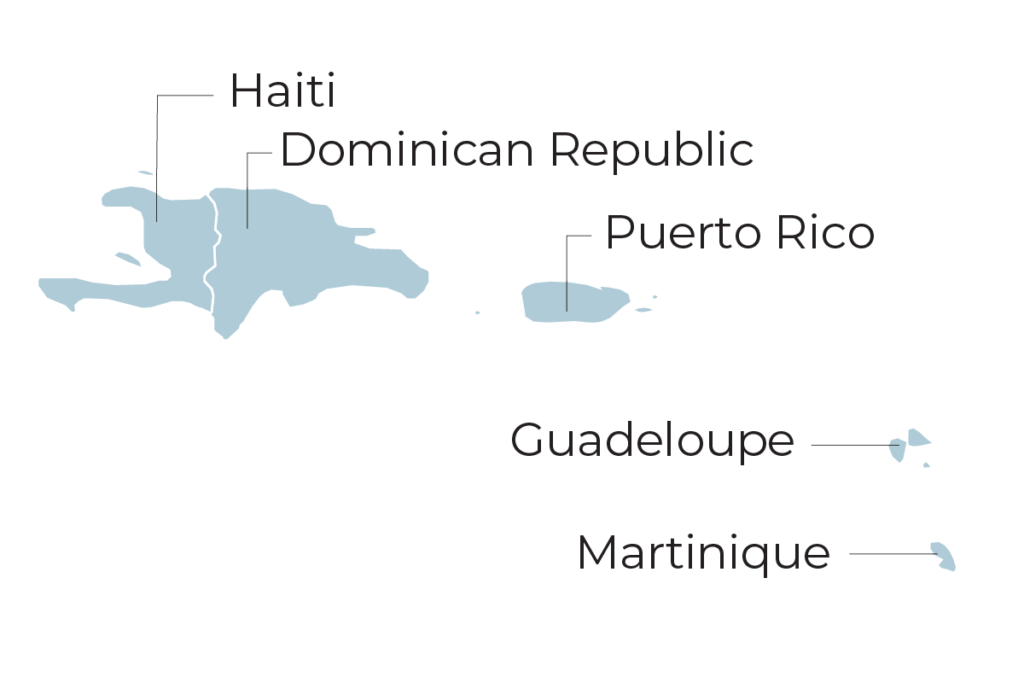Background
Study Duration: 2015–2018
Sponsor: National Institute of Allergy and Infectious Diseases (NIAID) Vaccine Research Center (VRC)
Therapeutic Area: Infectious disease
Indication: Chikungunya
Intervention: Vaccine
Phase(s): II
Study conducted at six sites in five countries in a CHIKV endemic region:
- Dominican Republic
- Guadeloupe
- Haiti
- Martinique
- Puerto Rico (2)

Challenge
Several challenges were presented to the study team in initiating and sustaining the trial in countries with varying levels of international clinical trial experience while needing to address external factors such as natural disasters and political unrest.
The varying levels of experience and capacity to conduct and coordinate a clinical research study impacted the timeline due to extended preparation and initiation at some sites. Also, shipping vendors had to use existing flight paths for specimen transport, challenging the integrity of cold-chain custody in non-US airports.
In September 2017, Hurricane Maria resulted in lost power, internet, phone service and mail service in Puerto Rico. Although enrollment and treatment visits had been completed, follow-up visits and remaining sample shipments were still pending. Failures to main and back-up generators that powered study offices and sample freezers risked sample stability. Follow-up visits to inform participants what they had received (vaccine or placebo) were challenged by the communication disruptions and participant displacement, sometimes to another country. Additional participant displacement occurred in Haiti due to political unrest, which also forced sporadic clinic closure for site safety. This contributed to delayed study close-out at this site.
Challenges experienced during the study:
Varying experience levels with international clinical trials
Varying levels of research capacity
Speciman transport restrictions
Lack of infrastructure and power due to natural disasters, including Hurricane Maria
Participant displacement and site safety due to political unrest
Solution
Based on successful previous partnerships with the VRC and other study partners, the Global Research Services (GRS) division of FHI 360, now FHI Clinical, was enlisted as a subcontractor at the beginning of the study to support site and investigator identification, site assessment, regulatory submissions and reports, site initiation, site management and laboratory support and cold chain assessment and management.
We provided multi-lingual support in the form of certified and approved informal translations. In addition, we facilitated communication between the sites and study team members who did not speak the local language.
Site support management was a service we provided based in our extensive experience conducting clinical research in resource-limited settings. In addition, we leveraged this experience to establish alternative plans for unexpected situations:
- Evaluating the cold chain process of the initial specimen shipment vendor, resulting in rapid assessment and implementation of alternatives to maintain specimen integrity during transport
- Ensuring that existing SOPs and back-up plans at sites were sufficient to maintain sample viability during power outages associated with natural disasters
Site and study team collaborations ensured solutions were appropriate for the context. In addition, flexibility was crucial to address issues, keep all stakeholders informed and manage the expectations of multiple prime and sub- contractors.
Services provided by FHI Clinical:
Results
In just two months, the FHI Clinical team:
- Identified 22 investigators and narrowed the total to 13
- Customized assessment tools
- Conducted pre-assessment site interviews
- Performed seven site evaluation visits, resulting in the selection of six sites
- Conducted cold-chain assessment and vendor set-up
- Assessed the laboratories’ skills and experience, and, where necessary, conducted training, including providing instruction on study-specific kits
Enrollment was completed in October 2016, one year after the first site was activated. Of the 400 participants enrolled, 363 participants completed the trial, a significant achievement considering some of the circumstances.
retention rate despite study disruptions due to natural disasters and political unrest
This project was funded in whole or in part with Federal funds from the National Cancer Institute, National Institute of Health under contract No. HHSN261200800001E.

